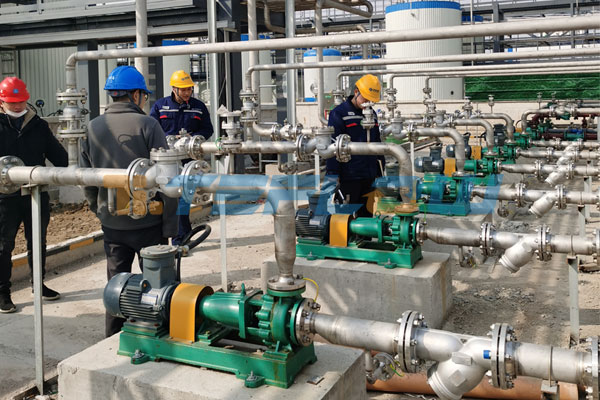Selecting the right pump for corrosive liquids is crucial to ensure safe and efficient fluid transfer while preventing damage to the pump and maintaining the integrity of the liquid being handled. There are several factors to consider when choosing a pump for corrosive liquids, including the type of corrosive substance, compatibility with materials of construction, pump design, and operational considerations. In this article, we will explore different pump options and discuss their suitability for handling corrosive liquids.
1.Chemical Resistant Centrifugal Pumps
Chemical resistant centrifugal pumps are commonly used for transferring corrosive liquids. These pumps are designed with materials that are resistant to the specific corrosive substance being handled. The pump's impeller creates centrifugal force, which helps move the liquid through the pump. Chemical resistant centrifugal pumps are available in various materials such as stainless steel, high-grade plastics (such as polypropylene or PVDF), or exotic alloys like Hastelloy or titanium. The choice of material depends on the corrosive nature of the liquid and its compatibility with the pump components. These pumps are suitable for transferring corrosive liquids with low to medium viscosities.

2.Air-Operated Double Diaphragm (AODD) Pumps:
AODD pumps are versatile and can handle a wide range of fluids, including corrosive liquids. These pumps use compressed air to flex diaphragms that create a pumping action. The liquid being transferred does not come into contact with any internal moving parts, which helps protect the pump from corrosion. AODD pumps are available in materials such as polypropylene, PVDF, or stainless steel, making them suitable for handling various corrosive substances. They are particularly useful when transferring corrosive liquids with high viscosities, solids content, or sensitive to shear forces.
3.Magnetic Drive Pumps
Magnetic drive pumps, also known as mag-drive pumps, are a popular choice for handling corrosive liquids. These pumps use a magnetic coupling to transfer the liquid, eliminating the need for a mechanical seal. The absence of a seal eliminates the risk of leakage and potential damage to the pump. Mag-drive pumps are available in materials like polypropylene, PVDF, or stainless steel, depending on the corrosive nature of the liquid. These pumps are suitable for low to medium flow rates and offer excellent reliability and leak-free operation.
4.Peristaltic Pumps
Peristaltic pumps are positive displacement pumps that use a rotating roller mechanism to compress and move a flexible tubing, which is the only part in contact with the liquid. They are an excellent choice for transferring corrosive liquids because the tubing material can be selected specifically for its compatibility with the corrosive substance. The tubing can be made of materials like silicone, Viton, or PTFE, which provide excellent resistance to corrosion. Peristaltic pumps are self-priming, reversible, and offer gentle handling of fluids, making them suitable for transferring corrosive liquids in various industries.
5.Sealless or Canned Motor Pumps
Sealless or canned motor pumps are hermetically sealed pumps that do not require a mechanical seal. The pump's impeller is directly mounted on the motor shaft, eliminating the risk of leaks or seal failure. These pumps are available in materials like stainless steel or alloys, providing corrosion resistance for handling corrosive liquids. Sealless pumps are suitable for high-pressure applications and are often used in the chemical industry for transferring corrosive fluids safely.





 +86 18130251359
+86 18130251359 teflowpumps@tlpumps.com
teflowpumps@tlpumps.com








 +86+0563-5093318
+86+0563-5093318
